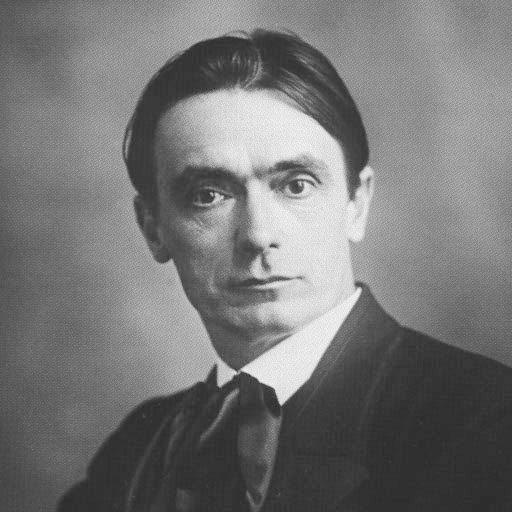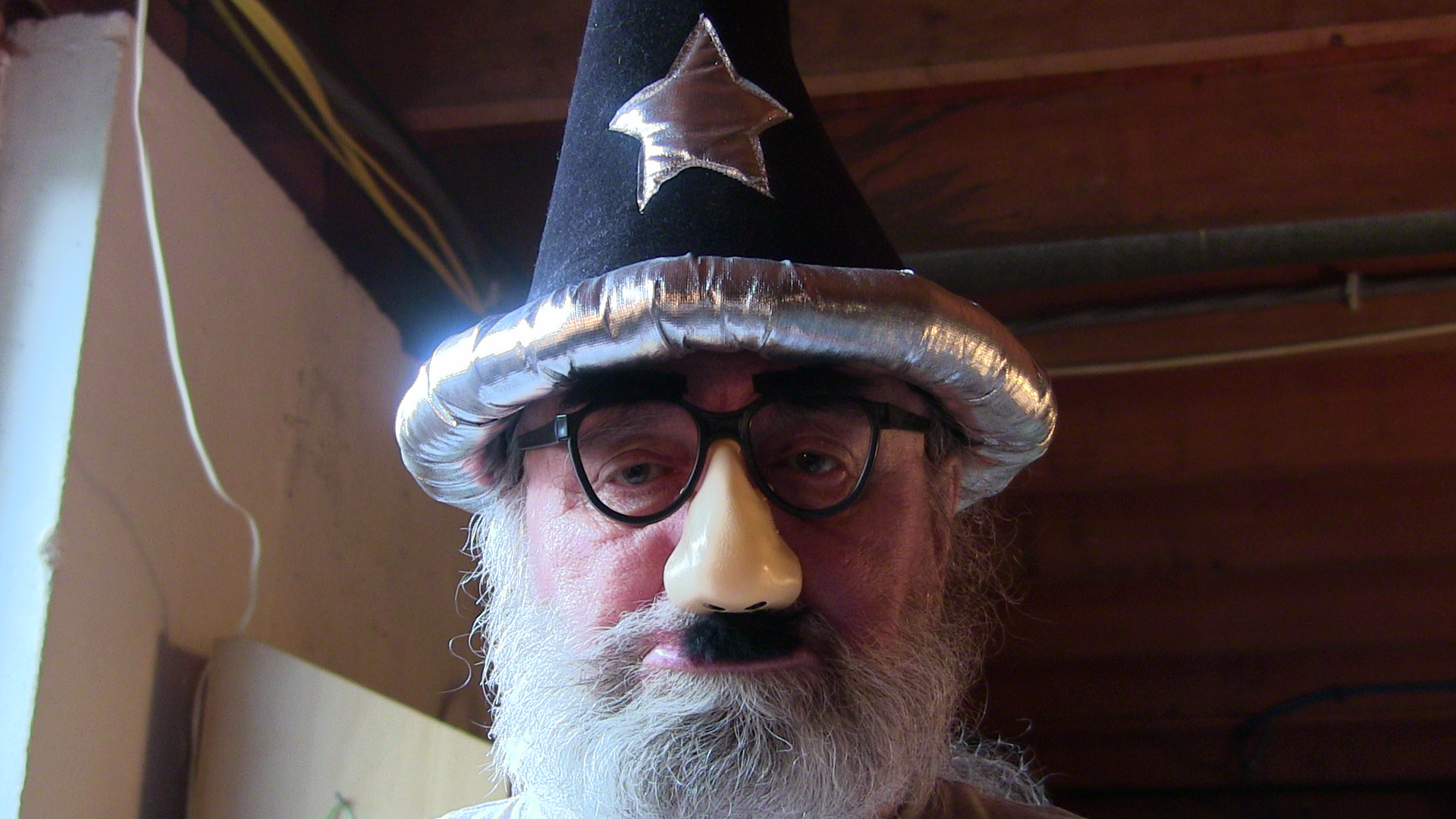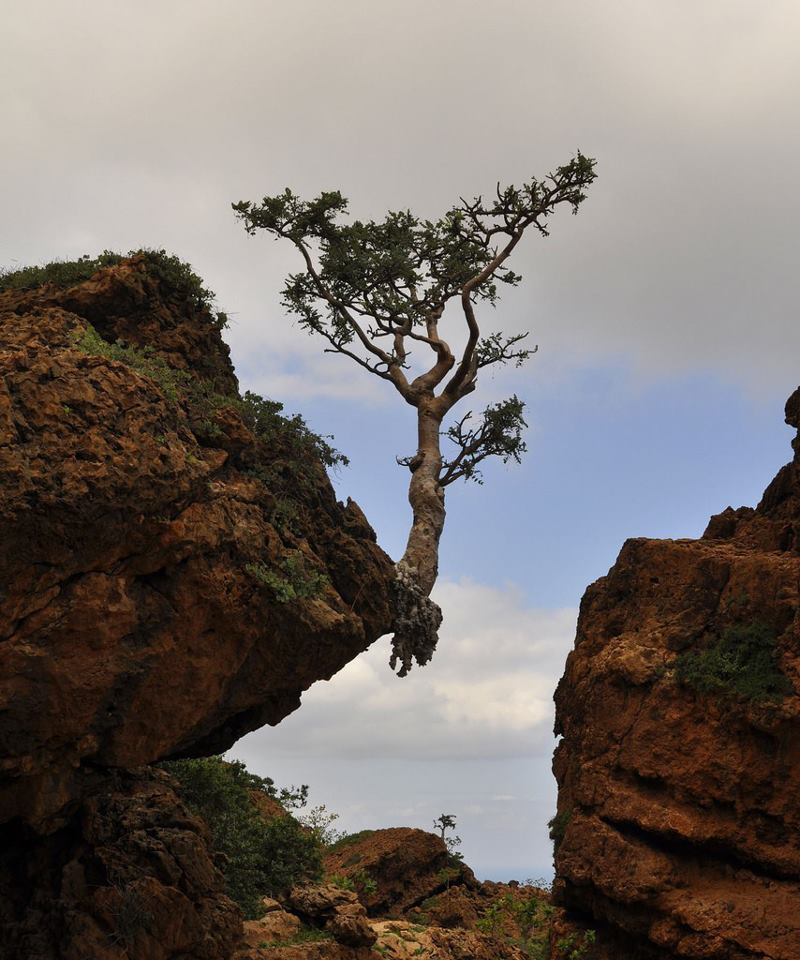Anarchy, Social Chaos, and Revolutionary Transformation,
within and about the Anthroposophical Society
All of humanity presently seeks to navigate social-seas of great turbulence. One need only read the News with a clear mind's-eye in order to see this. There are a million Arks trying to ride out this modern social-Flood. One such potential Ark is the Anthroposophical Society. A main feature of these Arks is their need to be living - that is to be organically flexible. If they are rigid with tradition, the savage nature of these seas will reduce them to kindling, and nothing of the original social-form will survive. We are also well past the time when there can be Noahs - leaders dominating the whole.
In other circumstances, ... I wrote that following the First Great War many deep thinkers in America became stand-up comics and cartoonists. This was due primarily to the fact that for a pragmatic people, which Americans are, when the world just gets more and more crazy, there isn’t a lot that one can do to cure these culture-wide forms on insanity. At the same time, humor was both a means to point out the insanity (gross irrationality everywhere), and to some extent diffuse its effects. If we can learn to laugh at our situation, and particularly at ourselves, a kind of soul balance can be obtained. See note (1) for a few details. The point here is to not take this essay too seriously. An excess of gravitas is one sign of the presence of the ahrimanic.
clearly archetypal anthroposophists ... do you notice yourself here?
* * *
What is the Anthroposophical Society? From one point of view, it is a social form engaged in Adult Education - adults gather together to study Spiritual Science and many other related subjects. How is adult education different from the education of the young, such as is done in Waldorf Schools?
First of all, the soul is mostly formed in an adult. Life choices have been made, karma is active, and a world view is in place. With the children most all of that is open. With adults it can seem much like a closed system. At the same time, for a variety of reasons, the adult is now aware of how much the world of their experience is seemingly out of sorts. That pain of life is where this otherwise closed system is open - an open wound some might say. People naturally want explanations and possible solutions for the suffering and pain they see everywhere, and experience themselves.
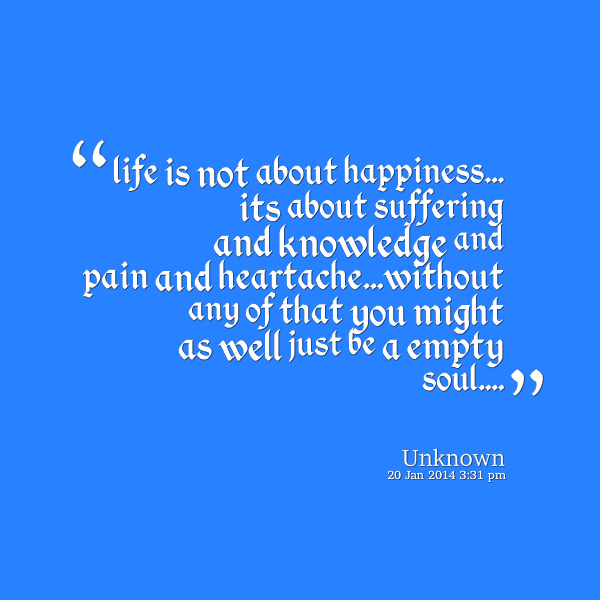
oops!
From science fiction writer Frank Herbert's novel Dune:
"When religion and politics travel in the same cart, the riders believe nothing can stand in their way. Their movement becomes headlong - faster and faster and faster.
They put aside all thought of obstacles and forget that a precipice does not show itself to the man in a blind rush until its too late."
It used to be that certain personal problems were taken up by therapists of one kind or another, but with the New Age, other modes of facing and encountering change became more acceptable. So people get life coaches, or learn yoga or meditation. They worry about their health, and if they have children they worry about the children’s education. A small few of these already encounter such as Waldorf or Biodynamic Farming and Gardening. Often when that happens, they then run into Rudolf Steiner in one way or another.
Underneath everything is the paradigm of Natural Science - with its Big Bang origin of the Universe in physics, or its Theory of Evolution in biology. As Owen Barfield points out, many of the individual words and common phrases in our languages have embedded in their meanings these ideas. Barfield’s works, in fact, ought to be the study-group material of any collection of folks who set out to consciously develop an adult education school. Again and again his works find their Way through the mine-field of modern languages and their built in assumptions.
Barfield is one of the Platonists that participated in our work during the 20th Century. I recommend: Speakers’ Meaning; History, Guilt, and Habit; as well as Worlds Apart.
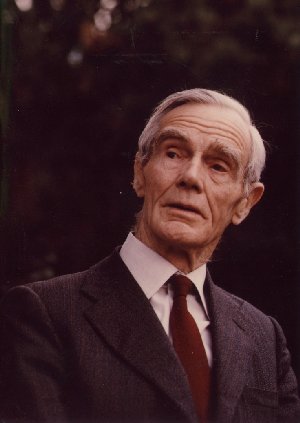

Barfield/Platonist Walt Kelly's Pogo Steiner/Aristotelian
In effect two myths confront each other when an effort is made to ride the modern seas of change, if we seek to foster in the A. Society, a less Steiner-oriented, more consciously Platonist, school for adult education. One myth is the assumptions and dogmas of Natural Science, and the other myth is our ideas about Rudolf Steiner and the significance and meaning of Anthroposophy. The social heart of a truly modern school needs to be a circle of discussions in which both myths become confessed, made conscious and explored. Both myths easily fit into what Steiner wrote at the end of the original preface for his book: The Philosophy of Spiritual Activity: “One must be able to confront an idea and experience it, otherwise one will fall into is bondage."
If we sleep as to the conceptual/idea content of our own minds, we will be the prisoners of these myths, whether we are an anthroposophist, or a secular humanist, or somehow: both.
Now the creation of this viable enterprise (a modern adult school - Ark) requires some foundational work. Mostly for Branch and Study Group members this means taking up the study of the works of the Platonists. Having acquired the language vocabulary of Steiner’s Spiritual Science (which is not Anthroposophy by the way, see the next several paragraphs), the Aristotelian tendencies in the Anthroposophical Society are just now ripe enough to best be able to meet the Platonists, and take in their inspiration. We are a very fertile ground awaiting new seeds. Note please that Emerson asserted that the only purpose of books is inspiration, and if they take us into their orbit (such that we abandon our own thinking) these books fail us. This tragedy, sadly, is basically an undercurrent condition of the mostly Aristotelian Society. Whether we call it Steinerism, or Steiner-said, it is the same. We made a myth of the “great initiate”, who could do no wrong, and many of us have believed in everything he taught, without any critical limits or considerations. On these rigid traditions, the potential Ark of the Society will founder in the coming seas of change.
An important distinction to appreciate is that Anthroposophy and Spiritual Science are not the same. That the use of the term “anthroposophy”, frequently among members and friends of the Society, conflates the two is evidence of our sloppy and unscientific thinking. In fact, if one applies critical thinking to the discourse in the Society, this is seen as evidence of being somehow not loving enough. The critical thinking is never argued with, but the personality (such as myself) is dismissed because we seem to say unkind things. That Steiner did this as well (say seemingly unkind things about the members and friends) is forgotten. I just follow where he went here (2).
I came to this conclusion on my own, but then subsequently found that Owen Barfield (see his Romanticism Comes of Age) agreed with me all the way back in 1933 in a lecture given in Dornach. Basically Anthroposophy is the method or how we do something, while Spiritual Science is the content or what we acquire. Notice these terms: method/how/do and content/what/acquire. The former is more active, and the latter more passive. They remain, however, in close proximity, being two sides of one coin.
One big clue here is this frequently used phrase of Steiner’s: anthroposophical spiritual science. If these two were actually an identity, that phrase would be the logical equivalent of saying or writing: grape flavored grape flavor, which is clearly nonsense. Anthroposophy then is exactly what Steiner said it was in the first sentence of the First Leading Thought: Anthroposophy is a path of cognition from the Spiritual in the human being to the Spiritual in the universe.
Daffy Duck trying to explain to Marvin the Martian what the word "Anthroposophy" means.
The initial problem came with the translation of the German word: erkennen, by many translators, to be read as: knowledge, when the better sense, in terms of Steiner’s epistemological writings (GA-2; GA-3; and, GA-4), is as cognition or perceiving. For English speakers the idea of knowledge more easily means the “what”, or a passively received content, than does the word cognition, which is a “how” and more active. This confusion is actually the ongoing working of the Ahrimanic Deception, or the Enchantment, via the intellect-aspect of the human mind. An awake cognitive activity, which elsewhere I name: the Rising of the Sun in the Mind, is how the Platonists in the Society (and elsewhere) have found their Way to the moral aesthetic of the Idea, while the Aristotelians has been drawn into a (hopefully) temporary prison of the abstract intellect (Steinerism or Steiner-said).
Again, the counter to this, for the mostly Aristotelian thinkers among the members and friends, is to concentrate on the reading of the works of Platonists. This intermixing, of the Aristotelian or abstract nature of Steiner-thought, with the pictorial and concrete nature of Platonist works, can only be done by individuals. This then prepares people to serve in the coming emergence of a free school of adult education, that wants/needs to replace the rigid traditions of the A. Society at the Dawn of the Third Millennium.
As individuals do this reading, and discuss it with each other, then the vocabulary bequeathed to us by Rudolf Steiner is enriched, and now we will be able to meet the “other”, or the thou, whose hunger for the true and the good has brought them into our newly evolving circles of mutual inquiry. A school of true adult education is not a situation where we pour into empty souls something we perceive they are missing, but rather a place where people on the same journey can aid each other in the development of the self-educated adult individual.
Someone reading both Steiner and the Platonists will have then a worthwhile experience that can be shared. But it is not the texts themselves (Steiner or otherwise) that is crucial, but the life changes each individual has learned and can now convey.
Recall now the point above about the collision of the two myths: The near-religious belief in the accuracy of Natural Science (something still very young) and a similar near-religious belief in the certainty of anything Steiner-said or wrote.
religion vs. science / Steiner and science / Platonists vs. Aristotelians
which is which? who is what?
does anyone really care?
One viable social model for this encounter is the Twelve Steps of Alcoholics Anonymous. Everyone there is equally a true believer in their individual denial system, and all must confess their addiction-bondage (3). Whether it is natural science, or spiritual science, any absolute belief in those ideas is a prison for the human being seeking to learn how to be a true and free thinker.
With this background, let us now look at this embryonic school from a different direction, so as to enrich the Idea (complex of concepts) we are experiencing here.
Now a school can be conceived of as a physical building, organized architecturally into classrooms, a gym, a playground, administrative offices and so forth. If we follow the Waldorf model we add gardens, and wood-shops, maybe even some chickens and goats. The reality is that each type of room or structure involves a function. The classical idea in biology is that: form follows function. So what are the needed functions of an adult self-educational school?
What is the function, or need? Places for human beings to meet. That’s it. Nothing else is required. Did Christ and the disciples wait to build a church first, before meeting? Of course not.
Another fact worth noticing is that people have different interests, so that this school would actually be self-organizing (something that happens all the time in this age of social media - witness what happened when Occupy Wall Street took over Zuccotti Park in New York City, or the recent Arab Spring revolutions). People took up different spaces for their particular needs, and then on occasion, as an added function/need, representatives meet collectively when necessary. One important point here is that these were organized from the bottom up, not from the top down.
Already the A. Society is organized into Branches and Study Groups, seemingly overseen by a no longer vital hierarchical organization. What does that hierarchical organization actually contribute, other than a kind of spiritual/intellectual dominance (such as: themes of the year or the meaning and purposes of conferences)? Who makes more money, from the Society? Who has more privileges? Whose ideas seem to have to descend from above toward those of us at the bottom?
If we study a lot of modern social forms, especially business forms, we will find that they tend to grow in such a way that still remains pyramidal in nature, with a top where the so-called directing power lies, and the bottom where the worker-bees provide the cheap labor. Sometimes the middle-management sector often expands, because of a law observed there, called the Peter Principle: “... people will tend to be promoted until they reach their “position of incompetence”.
In my last missive, I wrote that in our anthroposophical pyramid, the top was occupied by the ghost of Rudolf Steiner, or in our present language usage: the myth. At the bottom, dues are collected, as well as a great deal of gift money, and this all filters upwards to support the imaginary needs of the folks in the Centers: the Executive in Dornach, the Section leaders of the School, and the Councils in America. Money gets spent so that these folks can meet with each other, and so that there is some bit of organizational business-like activity taking care of dues collections, meeting organization, and other assumed necessary activities like publications and so forth. There are no doubt lots of travel expenses, and I would be very surprised to discover that our “leaders” pay out of their own pockets, for anything (fees, food, housing and so forth), when they go to our conferences, which they organize and intellectually dominate. Are we really being served in this Way?
Not only does being at the top (having reached their position of incompetence?) mean no costs and in some case no doubt an income as well, but they automatically get to be the leading speakers to which we must all endlessly listen. At one time I ran into the idea that the School was intended by Steiner to produce people capable of doing original spiritual research. Is there any evidence this is true today in practice? Prokofieff (4) fights with von Halle (5). Ben-Aharon takes his own path outside the Society (6). And the Platonists, who are perhaps former members of the School of Chartres, - none of them are certainly working and sharing their research with us from the "top". They are all in the Periphery or what otherwise could be called the bottom or the social commons.
How does this come about? Mainly because psychologically we are predisposed (by our own rigid and unconscious traditions) to grant these so-called leaders portions of the myth of Rudolf Steiner. This myth then includes the additional concept/tradition that these folks get to pick those who replace them on the basis that by already occupying that position, they are able to know who best should succeed them. They all say very nice things about each other, don’t they? A kind of mutual admiration society of people whose main skill seems mostly social-political, and the capacity to appear to be able to quote Steiner to excellent effect. This seems to me to be more like a department in a University, with all its struggles and competitions, than a truly esoteric/spiritual organism. Recall the quote from Frank Herbert above, about religion and politics being in the same cart, and not seeing the coming precipice. Did our leaders perceive the recent world-wide financial debacle? No, and all our institutions dove off that cliff.
Now I am not going to name names, but some of these folks get idolized, while others stay around for decades. Neither being idolized and adored, or having the ability occupy office for long period, and not be replaced, is a sign of competence at ... at what? Factually nothing new in terms of spiritual research is being, or has been, added since Rudolf Steiner died (except for the presently excluded Platonists), and we need to not forget that the whole group in Dornach, at that time just following Steiner's passing, fell into a cat-fight over who was to be adorned with his mantle of myths (see again, note 2).
Just think about the Sections of the School of Spiritual Science. They ended up being run by the same personalities as they were when Steiner died. They were not supposed to be, by the way. Nobody pays much attention to the actual history of the Society after Steiner left it, because - drum roll - one of his last acts was to completely change who was to be “in charge”. Then he died, and those changes were not implemented (see again, note 2).

poets and cartoonists - often wise
So, where are we now?
We need a function where people gather together to add, to the works of Steiner already being studied, the works of the Platonists. What, you say ... we already have that? Yes, we call them Study Groups. The Study Groups already self-organize themselves on the basis of shared interests. As the Platonist influence is digested, these interests will change, because the member and friends themselves will change.
Now each local area also has a Branch. This particular kind of social form is much like the type of plant organism that does not need the tree or bush or flower anymore ... it can root itself. All the life forces it needs are already there. The Branch and Study Groups don’t actually need anything above (or beneath) them at all. “What?” you say. What about conferences and meetings? Well that’s fine if you still want to go someplace and pay out of your own pocket to hear a small group of self-selected people speak. People whose main skill it that they most likely don’t know very much, but how to quote Steiner and remain a power in the institutions which themselves no longer serve a purpose. That's right, what is the purpose of our social stuctures? What is there that meaning for the future of Anthroposophy, because these people themselves don’t even know how to teach the how of the Rising of the Sun in the Mind. All they got is the content, - the method Steiner taught in his epistemological works has escaped their notice.
That’s a mouthful ... read it again, slowly.

Follow the yellow brick road to Dornach in the sky, where the wizard behind the curtain is a dead man,
or stop off at your local Branch and see who and what is really living in that place.
The Study Groups are the fruit growing on the limb of the Branch. The school for adult self-education is already there. The books of the Platonists are the bees going from flower to flower as the Branches experience their Spring, a justly earned blessing just in time for the start of the Third Millennium.
Imbibe the genius of spirit of Owen Barfield, and discover the myths and taboos of Natural Science. Throw off the myths of Rudolf Steiner and of the fantasy of pre-eminence among the so-called leadership. Take in the living nutrients and vitamins of the Platonists. Learn to think for yourself, without any need to quote anyone else ever again, unless it is to notice how what your own thinking has perceived was also thought by another.
And yes, pay dues, and provide gift money, but keep it where it belongs - only in the local community. The top of the needing to die hierarchical pyramid did just what the financial institutions did when times got tough - they fired other people and keep their own jobs, while still failing to actually accomplish anything for anyone else but themselves. Recall the little boy about the King who isn't wearing any clothes.
Throw open your doors to other seekers, and share what you have yourself experienced. But please, please, please, don’t try to make any more baby-Steiners. The world doesn’t need that. The world needs you, and you, and you. That's it.
All that said, what just happened? We had a spiritual revolution right on these pages, because we challenged the fundamental operational myths of the A. Society. We turned the traditional structure upside down and inside out. Obviously, unfortunately, these kinds of changes are not easily accomplished, and in few cases may not be wise. The point was to establish that our Idea of the existing relationships within the Society is itself a kind of fiction, based upon tradition. We keep to them because we have kept to them. For the A. Society to evolve, it must cut itself free of its past. Ahriman, in fact, likes us to live in the past, but it is a cold comfort, lacking as it does the passion of engagement with the present that Steiner called: enthusiasm.
Doing things because we did them before is never sufficient reason for continuing to do them. We need a now reason to justify maintaining a special group of people in preeminent positions of mythical authority. And, we need it from them. The executive, the leaders of the sections, the members of the councils in America, ... all must explain, with social-scientific accuracy, just why a third-epoch hierarchical social form is justified in the fifth cultural epoch.
Is it that simple? Can't be? Social Reality has inertia and momentum - things change but somehow remain the same. How to proceed in practice is a good question.
Is the language we use in the Society too full of specialized terminology, so as to be essentially obscure?
We believe we understand it, but need to recognize that most non-anthroposophists cannot.
It is a given that holders of power and trust seldom give that away, even though it might be wise to resign, while helping create something new and less traditional. Perhaps we should take another look at these matters, again seeking for something of a spiritual nature that is both radical and revolutionary, and as well able to provide additional income. This revolution will proceed from the Study Groups, and then the Branches. The last people to get it will be the Executive, the Section Leaders and the Councils in America.
As noted recently, all the world’s peoples navigate perilous social/historical seas, and troubles so dynamic as to suggest that we are in the middle of nothing less than the end/metamorphosis of Western Civilization. Yet, we would also be correct in noticing that Rudolf Steiner existed and did what he did, although it might help to carve away the excesses of myth. What did he actually do, and what is the relationship of that to our turbulent times?
He stood in the midst of the triumph of scientific materialism, on the cusp of the 19th and 20th Centuries, and discovered, and then revealed to the world, how to be scientific and empirical about the nature of the human mind/spirit. He then proceeded to take that personally developed art of the new mysteries of thinking, and turn himself into a source of new spiritual revelation, which he called Spiritual Science. But the key in that lock was the development of the mind mapped out in the book The Philosophy of Freedom: subtitled: some results of introspection following the methods of natural science. It was the science impulse that he used to foster new spiritual revelation.
The revelation - Spiritual Science, however, has been turned into a religion of Steinerism and Steiner-said. As Steiner predicted, the Cosmic Michaelic Intelligence (out of which he spoke) was materialized (made too fallen, rigid, and earthly).
Of all the millions and billions in the world, only a small few noticed. All the same, one matter that Steiner revealed was that on the cusp of the 20th to the 21st Century something else would happen, which he called The Culmination of the Anthroposophical Movement. Many of the Platonists would incarnate at the same time as the returning Aristotelians, and these would have karma to work out in relationship to the Anthroposophical Society.
In between these two cusps were a couple of other events. The first, beginning around 1933, was when people would become able to perceive the Cosmic Christ in the form of an angel in the Ethereal Realm, the realm where true thinking takes place. The other concerned the Bodhisattva incarnations of the Future Maitreya Buddha. In addition, this writer has pointed out the incarnation of Ahriman, which took place in 1950, at the mid-point between these two cusps.
So we have then Steiner’s redemption of thinking at the end of the 19th Century, the return of Christ in the Ethereal on the cusp of first third of 20th Century, one or more Bodhisattva incarnations of the future Buddha, the incarnation of the Ahriman, all in preparation for the Culmination at the cusp of the 20th and 21st Centuries, which was to include the return of several of the Platontists, that were apparently leaders of the School of Chartres from the 10th and 11th Centuries, which itself took place at the beginning of the Second Millennium. All these spiritually gifted individuals would be taking their places for the drama leading to the Dawn of the Third Millennium, and even Rudolf Steiner would return with several of those who had incarnated with him 100 years before.
And here we (humanity) are as well, at the time when the main scientific question/assertion/assumption is that the brain and the mind are the same, and that the human being is merely an organic artifact of an vast uncaring cosmos, developed by random and chance processes, with no spiritual meaning at all.
Anyone want to assert that what we in the Society do, at this point in time, is of little consequence, given that we are the only ones who seem to know all this stuff is going on? And, I might add, what does it mean that the leaders in the Executive, and the School and the Councils in America hardly talk about any of this?
if you already believe you are enlightened with all the answers,
because you are well read in Steiner, you might not be as wise as you think,
for the thoughts you include can in fact exclude others
Now me, I’m looking for a job, which is to teach this stuff to a wider audience, and in that way earn money for the Society while doing it. That’s my talent. That’s what my life trained me for. Plus I don’t need to be paid for it, and given the various electronic means available, I don’t need (like our “leaders”) to be transported anywhere and get to give speeches to large groups at conferences. But I can’t do that job on my own. I need your help.
In this way, we recognize that while the Society needs to become more like a school for adult self-education, it has some baggage (traditions) it needs to shed on the way to becoming that.
So, what next? But first a word from our sponsors, as to the question of Why Bother?
There are several reasons: A primary one is that I have been the beneficiary of the written works of many others. They bothered, and I benefited. Seems to be a good thing to do to pass that on. There also seems to be something at risk, which in my view is the Anthroposophical Society itself. What happens to the Society if it does not connect to the Platonists? My initial approach above was that there could be a failure in the Centers, such as the Executive, the Section Leaders, and the Councils in America, and this would be okay if the Study Groups and the Branches took up the needed labors on their own. In my article on the Culmination I wrote of it as something that required participation. We cannot be passive, but must be active participants in the Culmination on some level. To essentially conclude, as Stephen Usher did in his article, that the Culmination is or has happened, and then perhaps relax and leave things to take whatever course they seem to want to take, is to my thinking to abrogate our responsibility. If the members and friends and the leadership do not participate, something that belongs to the heart of the work will not arise, and the Society itself will founder on the coming seas of great changes.
To know that there are matters we can do, we only need read Steiner's Awakening to Community. Its basically all there, in one form or another. In there is my last reason, which begins to be understood with this quotation: (lecture three), on the consequences of failing (which has happened) to take up The Philosophy of Spiritual Activity (or Freedom): "The way it should be read is with attention to the fact that it brings one to a wholly different way of thinking and willing and looking at things....The trouble is that The Philosophy of Freedom has not been read in the different way I have been describing. That is the point, and a point that must be sharply stressed if the development of the Anthroposophical Society is not to fall far behind that of anthroposophy itself. If it does fall behind, anthroposophy's conveyance through the Society will result in its being completely misunderstood, and its only fruit will be endless conflict!"
We seem to be, within the Society itself, swimming in seas of conflict (Prokofieff vs. von Halle; law suits over the Constitutional Question; even this paper is an elaborate disagreement). All this related to not collectively appreciating the importance of his book: The Philosophy of Spiritual Activity. All kinds of people have read it, and many treat it the same way most Christians treat the Sermon on the Mount, as something essentially inspirational. It is not. It is a map to the mind - a very good map. Like the Sermon on the Mount, however, it needs to be practiced - the mere reading of it doesn't work. Recall, if you will, that last verses of the Sermon: "Therefore whoever hears these sayings of Mine, and does them, I will liken him to a wise man who built his house on the rock: and the rain descended, the floods came, and the winds blew and beat on that house; and it did not fall, for it was founded on the rock. "But everyone who hears these sayings of Mine, and does not do them, will be like a foolish man who built his house on the sand: and the rain descended, the floods came, and the winds blew and beat on that house; and it fell. And great was its fall."
Ultimately all any of us have to give is ourselves. There are sports cliche's to cover this. From poker: "All in." Or, "leave it all on the field." Some of those strategies and tactics are what is next. Even though it sometimes appears that the other guy as all the chips
Things I can do to keep busy while I grow more and more ancient,
and for which I must confess I need help
Outrageous Logical Speaking
If possible, those American anthroposophists, with some influence in the academic world, might want to see if they can create opportunities for me to be on a stage with the likes of such as Sam Harris or Richard Dawkins, leaders of the new atheist movement. These would not be debates but conversations, where a Platonist (me) trained by studies of Barfield, Steiner, Kuhlewind, Adams, Lehrs, Talbott, Holdrege, Brady, Clarke, Klocek, MacCoun, Tomberg, Cowen, Schmidt, Hauschka, Schad, Schwenk, Kuhn, Shaing, - its a really long list from 40 plus years of preparation, sits down with such folks and asks them questions, just like Socrates. For a further example of my preparations, who among the so-called leading personalities can say they read Steiner’s lectures on Spiritual Science and Medicine - twice, as well as Victor Bott’s Anthroposophical Medicine. Or George Adams’: Universal Forces in Mechanics; Space and Light of Creation; and, Physical and Ethereal Spaces; as well as read and studied Whicher’s Projective Geometry. None of these studies, by the way, are about the content per se. Rather it is about developing the mind in such a way that it frees itself from the limitations of our ordinary education and language.


my office desk where I type these #@$^&!% weird essays
We make sure these conversations with leaders of the new atheists are digitally recorded and uploaded to the Internet. Why the new atheists? Because the discussion concerning the relationship between science and religion in modern times is a crucial public discussion; and, because Harris, for example, is a student of consciousness and a believer in the concept that the brain is the seat of everything - all is matter there is no spirit. Anthroposophy, or the Rising of the Sun in the Mind, needs to participate in these dialogues.
Platonist Think Tank (what will he think of next?)
Another kind of help would be to aid me in forming a kind of actual spiritual think-tank. As a place marker, lacking the dialogue to make a group selection, lets temporarily call this: The Pharaoh Foundation. Again using mostly electronic means I would be supported in connecting with leaders in any field which has some interest in the future. Not the future as it should be (not an ideology, such as social threefolding), but the future as it is actually becoming. They pay a fee for services to the think-tank, which is owned by perhaps something like the Rudolf Steiner Foundation, an already existing structure for funneling capital to the daughter movements and so forth. Again, this is a situation where the process is Socratic. I don’t tell those who attend these seminars, what to think, but by asking questions they don’t yet know can be asked, I lead them to perceiving the true future out of their own activity of thinking.
Call On Your Mother! (visits to elders?)
This last can appear to be a bit rough, but is something that is needed in order to get the most traction in the A. Society itself. The leadership should be encouraged to call on me, where I live, when the opportunities arise and they are in the neighborhood (anywhere in New England). Now this isn’t about “kissing my ring” or setting people up to bow to some kind of power. It is about courtesy due an elder, and about them having to go through the process of considering, through deeds, that they don’t know everything, and that the Platonist impulse is important enough to go out of ones way in order to engage it. Again, I’m not going to tell them anything. They just need to dare to meet someone who is going to ask them very interesting questions they need to be able to answer.
Just keep in mind that I am 73, and not necessarily going to be alive next week. Any Aristotelian, that wants to seriously consider the Platonist impulse, ought not to just read their books, but should go out of their way to meet one or two. It doesn’t have to be me, for example. There are two other Americans mentioned in my article in the Culmination, and two Europeans. The Executive doesn’t have to go to America, as Scotland (Elizabeth) and Italy (Bruno) are far closer. That’s five possible former members of the School of Chartres, if you are into that aspect of things (I don’t recommend it by the way, because none of us in this life are who we were in any other.) Plus, everyone from the original Ark is pretty down to earth, and maybe a bit spicy too.
The Executive, and the Section Leaders, and the Council members in America, just have to be encouraged to show, by example, that the Platonist works are worthy of reading, and the personalities are worthy of meeting. After all, they get paid to go all over the world to be the center of attention, and give lectures to the rest of us all the time. Maybe the spiritual community, that is the true Anthroposophical Movement, needs to see them trying a little harder, and demonstrating that they are willing to learn more than just Steiner, and that from the living.
Of course, for us regular folks, going to pay an honoring visit is not so dangerous to the ego, so if you are in America, Stephen hangs out in Santa Fe, New Mexico, and Catherine hangs out in around Chicago, I believe. Yes, I’m not handing out addresses and phone numbers, but in the Culmination article (7) there is a trail that any detective-minded individual can follow to find any of us.
A Living Global Library, meant to survive the end of Western Civilization
(just go to the link, please: The Global Mind)
And finally, from the dessert tray:
Cosmic Politics
This would be a made at my home (with some good tech equipment etc.): A ready for Internet or Cable, round table TV discussion with me and several ordinary people. Same methods: Socratic. What is missing from the political conversation is regular folks, getting asked sane questions, by someone who knows how to do that without looking for an agenda or a sensational story. Again, I need help to bring this off ... some money for tech stuff (we can use the dinning room in our home); a tech person to help us set this equipment up initially, and be able to trouble shoot when necessary; a producer to round up folks who want to be interviewed (and who can mostly manage not to throw things at each other); and someone who knows about the Internet programing scene to guide us into how to do that. We don't necessarily want a continuing cast of "characters", but some folks should get to be on more that once, as they will get better and more relaxed over time. I can guarantee it will find an audience, because lots of normal people would like hearing folks similar to them say something sane. We include a feed back system and maybe also read e-mails aloud that get sent in. Except for the tech folks and the producer, nobody else gets paid and the whole thing runs on gift money, which may only be needed in the start up phase.
Notes:
(1) Cartoonists: Warner Brothers Bugs Bunny’s “What’s up Doc?” (he’s the archetypal anarchist); Mad Magazine’s Alfred E. Neuman: “What? Me worry?”; Walt Kelly’s Pogo, who says in 1970: “We have met the enemy and he is us.” and then Bill Griffith’s Zippy the Pinhead: “Are we having fun yet?” (the Zeitgeist in one sentence). The deepest was Bill Watterson’s Calvin and Hobbes, impossible to describe, yet full of amazing social observations.
Stand-up Comics (beginning with Will Rogers) have to include George Carlin and Robin Williams, as well as Williams’ mentor Jonathan Winters. Right now in America the most potent news analysis is on cable’s The Daily Show, and the Colbert Report. Philosophy has always been about clear and precise thinking, which ought to include a sense of humor. The question then remains: Are we having fun yet?
(2) General Renewal – or Illusion – of the Anthroposophical Society, by Harald Giersch http://ipwebdev.com/hermit/Giersch.html
(3) The Spiritual Scientific Import of the Twelve Steps of Alcoholics Anonymous: http://ipwebdev.com/hermit/TwelveSteps.html
(4) http://ipwebdev.com/hermit/Prokofieffbookreview.html
(5) http://ipwebdev.com/hermit/vonHalle.html
(6) http://ipwebdev.com/hermit/benaharon.html
(7) http://ipwebdev.com/hermit/Culmination.html


